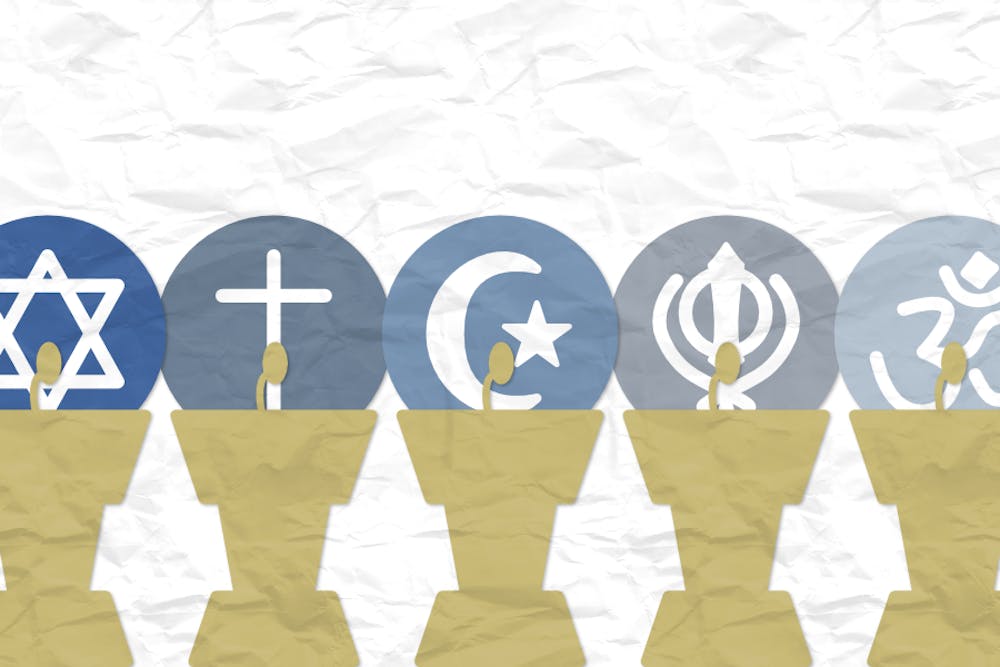Growing up as a practicing Catholic, my faith never seemed to be in conflict with my identity as an aspiring biologist who understood evolution or as an American who believed our separation of church and state was one of our most important values. As I’ve gotten older, I’ve come to learn that my religious identity will always make people question my appreciation for science and the secular state. I think back to the shock of one of my close friends when he found out that I considered myself religious (despite the cross that I’ve worn around my neck for our whole friendship), he replied with “I thought you were a woman of science.”
While this may seem ridiculous, to anyone paying attention to the news it shouldn’t be all that far-fetched. Think back to September 2020 during Supreme Court Justice Amy Coney Barrett’s confirmation hearings, and the assumptions about the way her Catholic faith would impact her decision making. Senator Diane Feinstein, Democrat of California, questioned Barrett’s abilities, upon her nomination to the appellate court in 2017, now infamously known for saying, “the dogma lives loudly within you.”
The stigma and wariness of religious people is not new, nor is it isolated to Christians or even conservatives. Progressive House representative Ilhan Omar, Democrat of Minnesota and a practicing Muslim, has faced extensive prejudice about her faith. The first amendment protects our “freedom of religion,” however this right has devolved into “freedom from religion” that has made people fearful of those who practice their religions, a reality that has become very poignant to me in taking a religious studies course this semester.
It corresponds quite directly to an overwhelming decrease in religious affiliation and engagement amongst the American public. In 1951, approximately 1% of the population identified as having “no religion,” a number that has since increased to 20% in 2020. Concurrently, we’ve seen a decline in the marriage rate from around 86% in 1970 to around 33% in 2019 and a similar decline in mental health among other things which may be loosely correlated to a loss in religion. So is this degradation of faith in a country with “In God, We Trust” embolden on its currency, a good thing?
Our age group is overwhelmingly more irreligious than our parents, with 1 in 4 people ages 18-22 claiming to have “no faith.” Depression is equally most prevalent among ages 18-24, a rate which has increased in the last 20 years. These statistics made me curious about the religious climate at Penn, a secular university with limited religious ties particularly when compared to its peer institutions as well as ranked number one in the most depressed student body.
According to the Office of the Chaplain, approximately one-third of Penn students are involved in religious groups on campus in some capacity. As I surveyed members of various different organizations including Penn Hillel, Penn Cru, Penn Muslim Students’ Association, and Penn Hindu and Jain Association, I was moved by how positive the collective experience was.
For some of us, religion is reminiscent of family, identity, and culture. While this can for some make faith obligatory, it can also provide a feeling of comfort, especially in a new place. First-year Lilah Katz, who is involved in Penn Hillel, expressed how her on-campus involvement actually enriched what she understood about Judaism growing up, saying, “Being apart of Hillel helped me learn more about the range of my religious community and the beauty of the diversity of my faith.”
I found a similar response from another first-year Ibrahim El-Morsy, who, despite being a practicing Muslim and member of Penn MSA was motivated to join Cru, a Penn Christian fellowship group which he describes to have enhanced his spirituality and sense of community on campus. He explained, “Just the question: ‘Can I pray for you for anything?’ is so significant. Not ‘how are you? And saying I’m fine’ but actually being honest and meaning it and feeling like people can help you.”
RELATED:
Lexi Boccuzzi | The siege on free-speech social media
Lexi Boccuzzi | Rev. Martin Luther King’s complex and lasting legacy
Upon my arrival at Penn, I similarly got involved in the Penn Catholic Newman Community, participating in their freshman retreat and joining my very first bible study this semester. Whether or not I holistically subscribed to its doctrine, my faith has always provided me with the security and stability to endure through new and difficult experiences.
Don’t be mistaken, I’m not deaf to the very complicated pasts of world religions. I understand the complexity of subscribing to an institution that has a long and grey history. However, through my own experience, I can attest to the importance of not judging people based on their faith.
Steve Kocher, Senior Associate Chaplain and Director of Spiritual & Religious Life Center at Penn said on the value of religion on campus, “In that sort of space [college] we think that religious and spiritual communities can provide important reflective space to help keep things in perspective, with people who care about you.”
Particularly in light of the events of the last year, we could all use a place for reflection, appreciation, community, and hope. If people find strength and support from their religion, you shouldn’t knock it until you try it.
LEXI BOCCUZZI is a College first year studying philosophy, politics, and economics from Stamford, Ct. Her email is abb628@sas.upenn.edu.









